HIGHLIGHTS: JUNE 14, 2024
• USDEC backs U.S. cow milk entries to WCA
• Homeland Security bill earmarks funding to stop cargo break-ins
• Senate farm bill framework contains dairy trade priorities
• USDEC healthy snacking seminar draws a crowd in Vietnam
• Mexican food science students learn about dairy use in indigenous cheese
• East, Gulf Coast port talk break down
• Market Summary: Chinese farmgate milk prices continue slide
• New Zealand dairy farmers commend emissions trading decision
• DMK to scale back capacity as milk production declines
• Company briefs: Saputo, Yakult, Mona Dairy
Featured
USDEC backs entries to 2024 World Cheese Awards
The 2024 World Cheese Awards (WCA) are now open for entry. The WCA, taking place this year in Viseu, Portugal, on Nov. 14-15, is one of the most respected cheese competitions in the world, attracting thousands of entries each year.
USDEC wants to make it a little easier for your company’s cheese to be among the contenders. As in past years, the U.S. Dairy Export Council will be supporting U.S. cheesemakers by covering the WCA entry costs for up to 300 U.S. cow's milk (including mixed-milk) cheeses. USDEC will also provide support in applying for the shipping documentation required to enter the competition.
While the entry deadline is Friday, Sept. 8, that date could be moved up if the entry cap is reached. Since the organizers have placed a cap on the number of entries this year, and USDEC will only be covering costs for the first 300 U.S. cow’s milk cheeses entered into the competition, we encourage U.S. cheese suppliers to enter as soon as possible. For more information or questions please reach out to Nuhami Alemu at nalemu@usdec.org.
Registration instructions
If your company has participated in the WCA before, login to your MyGuild account. If you don't have a MyGuild account, please follow these instructions.
Once logged into your account, click the “Enter awards” button and follow the on-screen instructions to enter your cheeses into the competition.
Once you've added all your cheeses and arrive at the payment page, follow the step below that aligns with the cheeses you entered:
- If you only entered cheeses made with U.S. cow’s milk (including mixed-milk), you have completed your online registration. DO NOT input your payment information. USDEC will be unable to refund companies that process payment for covered cheeses.
- If you entered any cheeses that are not made with U.S. cow's milk, process payment for only the non-U.S. cow’s milk cheeses by selecting them on the page and entering your payment information; USDEC will cover the cost of the U.S. cow's milk cheeses.
After you have completed the registration process, please send an email to Nuhami Alemu (nalemu@usdec.org) with the subject line “WCA 2024 - Bill to USDEC.” In the body of the email, please include the following information:
- Your company name.
- The number of eligible U.S. cow’s milk (including mixed-milk) cheeses you entered into the competition.
Once registration closes, USDEC and the WCA will be in contact with further instructions. Please reach out to the WCA (worldcheese@gff.co.uk) if you experience any issues throughout the registration process. We look forward to another successful U.S. showing at the 2024 World Cheese Awards!
Funding package contains money to stop cargo break-ins
On Wednesday, the House Appropriations Committee voted the fiscal 2025 Homeland Security Appropriations Act out of committee. The funding package includes $2 million in new appropriations for a Homeland Security Supply Chain Fraud and Theft Task Force dedicated to addressing the organized crime groups that are breaking into intermodal containers on rails and trucks.
USDEC and NMPF have been working with parcel carriers to include this new language, led by Rep. David Valadao (R-CA).
The bill addresses rising instances of criminal groups indiscriminately breaking into containers en route from the Midwest to West Coast ports in search of high-value consumer goods. While the thieves are not looking to steal dairy, dairy exports are becoming collateral damage. Exporter who have containers opened frequently have to bear the full cost of returning and disposing of the product—without recourse to insurance claims.
According to the Act, “HSI [Homeland Security Investigations] shall consult with SLTT [State, Local, Tribal and Territorial] and federal law enforcement agencies, as well as relevant private sector stakeholders, to ensure such task force employs a coordinated, multi-agency, intelligence-based, and prosecutor-led approach to identifying, disrupting, and dismantling organizations primarily responsible for the theft and theft-related violence in the American supply chain.” Click here for the full text of the bill.
Senate farm bill framework reaffirms major dairy trade priorities
USDEC commended the introduction of the Senate farm bill framework introduced this week by Sen. John Boozman (R-AR), Ranking Member of the Senate Committee on Agriculture, Nutrition & Forestry. Among its provisions, the framework includes two major U.S. dairy export priorities that USDEC has strongly supported:
- The Safeguarding American Value-added Exports (SAVE) Act—a landmark bipartisan measure that provides direction to the U.S. government to proactively negotiate protections for terms that are frequently at risk of confiscation by the EU’s misuse of its geographical indications system.
- Doubled funding for the Foreign Market Development (FMD) and Market Access Program (MAP) programs—two key sources of USDEC funding for in-market programming around the world. “Critical MAP and FMD funding helps to retain some balance in a competitive playing field that continues to tilt in our competitors’ favor,” said USDEC President and CEO Krysta Harden in a statement on the framework.
The framework follows the passage of the House version of the farm bill out of committee in May (see Global Dairy eBrief, 5/31/24). There is also no bill text for the Senate version. Boozman said he and other committee members next have to sit down and get “the farm bill done, or agree to disagree and start working on an extension” of the 2018 farm bill.
Capitalizing on healthy snacking opportunities in Vietnam
Last week, more than 180 Vietnamese food and beverage industry professionals attended USDEC’s Healthy Snacking Innovation Seminar in Ho Chi Minh City, Vietnam. The June 6 event aimed to capitalize on parallel eating trends in the region: Health and nutrition are increasingly in focus for Vietnamese consumers, alongside growing demand for convenient food options that fit within busy lifestyles.
“With greater attention on healthy eating, opportunities for products leveraging U.S. dairy ingredients continue to emerge,” said Keith Meyer, USDEC marketing director, Global Ingredients Marketing, who also moderated a U.S. dairy supplier panel session at the event. “Opportunities for food and beverage manufacturers to formulate snacks that align with nutrition and convenience-driven consumption help to make a fertile environment for U.S. dairy ingredients suppliers.”
Speaker lineup deliver protein facts
Nutrition, consumer insights, and food and beverage application experts shared their knowledge and ideas for meeting Vietnamese consumers’ rising demand for convenient, tasty, and nourishing products by fortifying foods and beverages with U.S. dairy proteins and other ingredients.
Registered dietitian and long-time USDEC collaborator Leslie Bonci, owner of nutrition consulting company Active Eating Advice, discussed protein’s critical role in muscle health and, by extension, overall health (including benefits to strength and mobility for daily activities, weight management and metabolism). She explained the concept of protein quality and why dairy proteins are considered high-quality, nutritionally complete proteins. She also stressed the importance of balanced, rather than skewed, protein intake throughout the day, spanning breakfast, lunch, snacks and dinner.
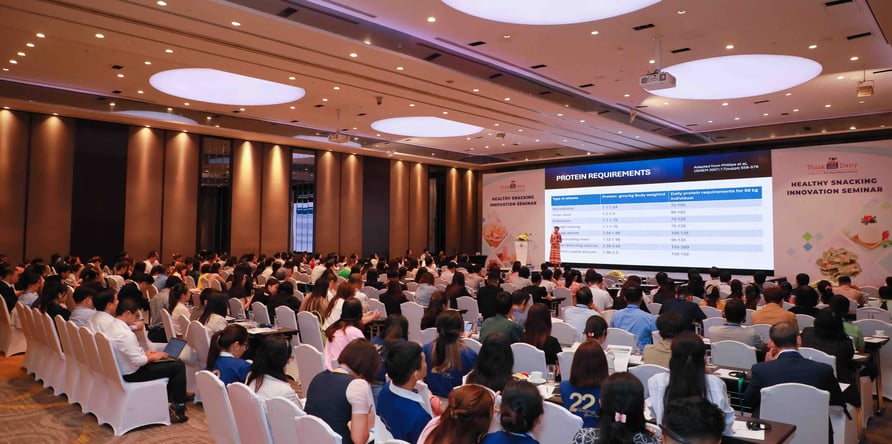
Leslie Bonci (front, standing) speaks to a packed house of Vietnamese food and beverage industry professionals at the June 6 USDEC Healthy Snacking Innovation Seminar in Ho Chi Minh City.
Multiple speakers, including Martin Teo, USDEC Southeast Asia’s senior director, food applications and innovation, made the point that U.S. dairy ingredients’ functional and sensory attributes make them particularly well suited for use in a wide variety of food and beverage applications.
Seminar attendees sampled several U.S. dairy protein-enriched product concepts that could be woven into busy, health-conscious Vietnamese consumers’ daily routines, including protein sesame crisps, a bite-sized mango chewy snack and a honey ginger flavored milky protein beverage.
U.S. dairy suppliers took the stage to express their desire to work with Vietnamese food and beverage manufacturers, detailing how their diverse and evolving portfolio of dairy ingredients make it easy to deliver nutrition through a wide range of products that meet Vietnamese consumer needs.
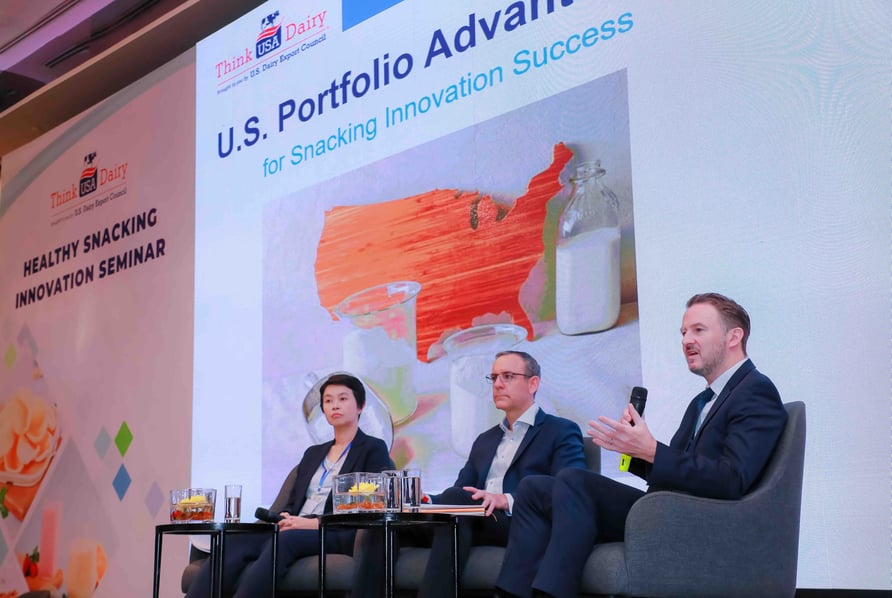
Left to right: Veena Trangtrakul, Dairy Farmers of America; Gabriel Sevilla, Proliant Dairy Ingredients; and Edgar Baudoux, Glanbia Nutritionals highlighted how the U.S. dairy community is committed to partnering with Vietnamese food formulators to support their product innovation goals.
Additional event targets students
In conjunction with the trip, Bonci also gave a presentation to approximately 150 food science students at Ho Chi Minh City University of Technology (HUTECH). She delivered similar messages on dairy protein nutrition, functionality and versatility and the importance of protein quality.
“Our students loved your presentation, with so many ideas for new products that they could develop in their course projects next semester,” said Dr. Nguyen Le Ha, Dean of HUTECH Institute of Applied Sciences, in a thank-you email.
“That was precisely the aim of the presentation, to inspire Vietnam’s next generation of food and beverage industry leaders about bright innovation potential with U.S. dairy ingredients,” added Meyer.
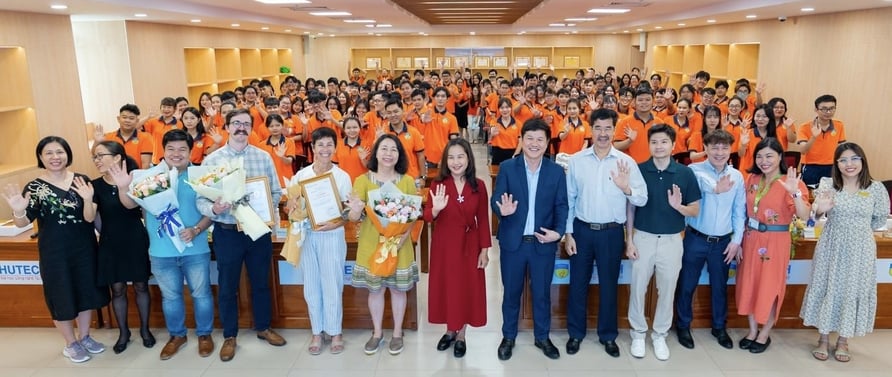
USDEC speakers stand with educators and students at Ho Chi Minh City University of Technology.
Mexican dairy science students learn how to use U.S. dairy ingredients in indigenous cheese production
Part of USDEC’s partnership with Mexico’s Tec de Monterrey focuses on educating students on U.S. dairy ingredient applications and functionality. Since 2022, the technical university has been providing dairy and food science students with for-credit classes on the benefits of using dairy ingredients in food products. Last week at the Queretaro campus, a group of 21 students participated in a workshop on how to use U.S. dairy ingredients in indigenous Mexican cheeses.
Ruben Zarraga, dairy science director and professor in charge of the Queretaro campus of Tec de Monterrey, led the workshop. Zarraga has worked closely with USDEC on many activities in recent years, including cheese and ice cream manufacturer workshops that have connected Mexican buyers with U.S. suppliers. Javier Roldan of the USDEC Mexico team is also deeply involved in the workshops and was in attendance.
“Mexican food science students are looking to learn about dairy ingredient innovations, new applications, functionality, cost-efficiency and nutrition, among other information,” said Dr. Zarraga previously said in describing the reasoning behind the program. “These students will be working with these ingredients in the future, so it is very important to have them ready for their professional challenges.”
Below are some images from this week’s event.
“The students were very engaged and enjoyed the hands-on opportunity to gain knowledge that they can apply in their careers after their graduate,” said USDEC Mexico office leader Rodrigo Fernandez.
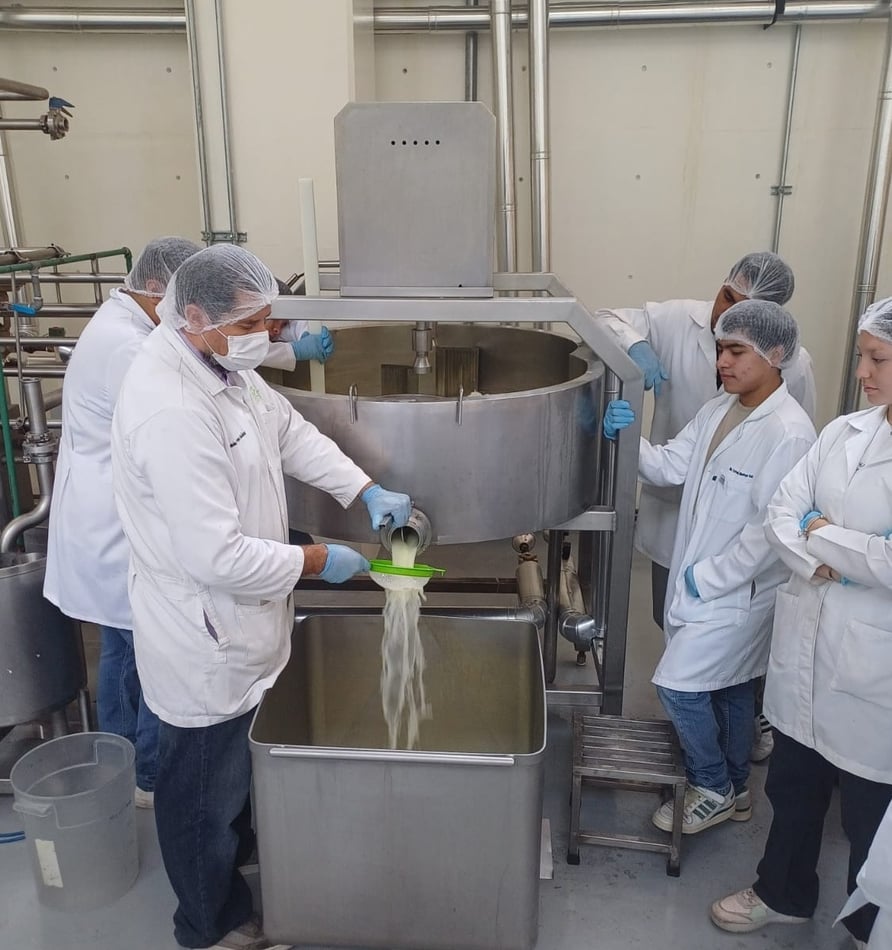
Professor Ruben Zarraga strains curd during the workshop. An important element of the training is the rehydration process of the milk powder and other dry ingredients.
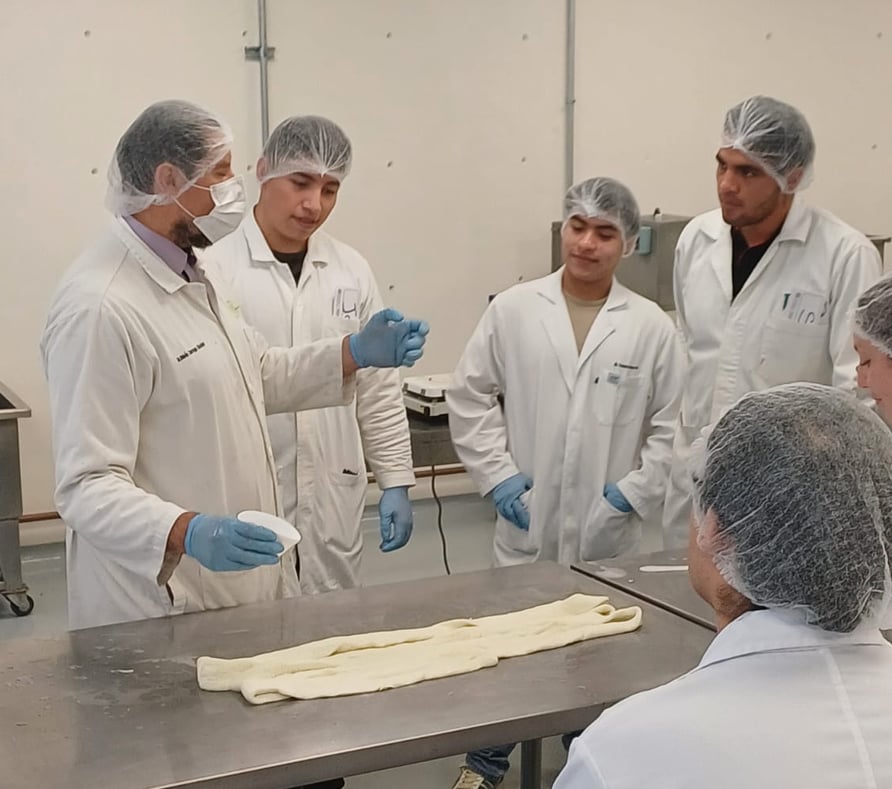
Oaxaca cheese in process—the final product ends up in a ball shape. Oaxaca is a fresh cheese similar to mozzarella
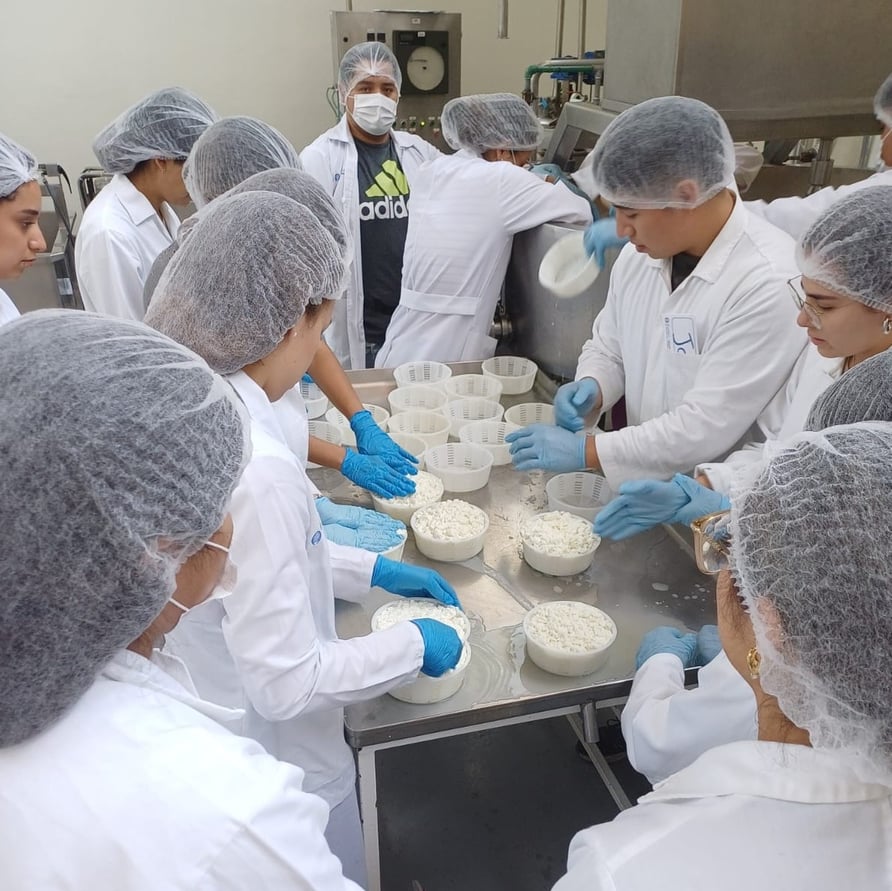
Students handle Mexican queso fresco—a fresh, crumbly cheese often used as a topping for tacos, soups and salads.
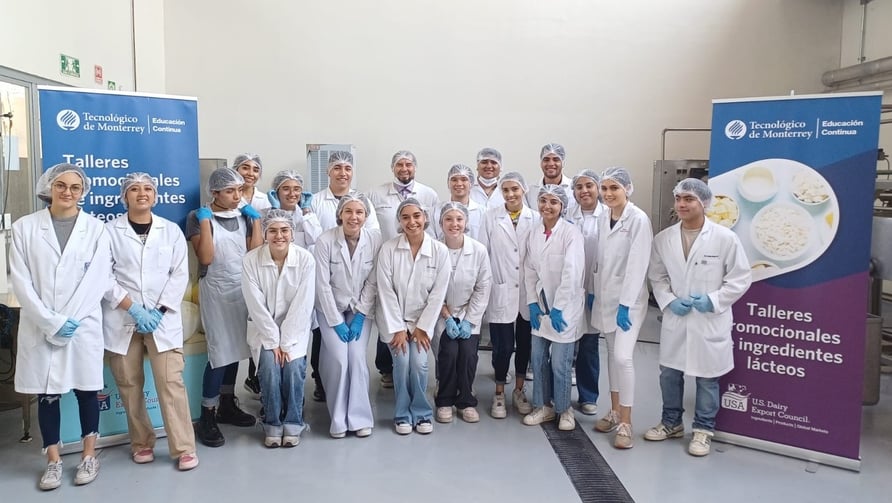
Tec de Monterrey students pose with instructor Professor Ruben Zarraga upon completing the workshop.
Supply Chain
East, Gulf Coast port contract talks break down
The International Longshoremen’s Association (ILA) suspended negotiations on a new labor contract that were set to take place this week. The ILA cited the use of an automated gate system at a terminal at the Port of Mobile as a breach of its existing agreement with United States Maritime Alliance (USMX). A.P. Moeller-Maersk and APM Terminals, which is owned by the Dutch carrier, responded that the system is in full compliance with the labor contract and that it would work with the ILA and other stakeholders to address concerns.
Automation and wages (perennial dispute points in dockworker contract talks on both coasts) are the two biggest hurdles for a new contract, and the union said the automation issue must be resolved before high-level talks on wages can even begin. With four months remaining before the existing contract expires on Sept. 30, the ILA also said it was skeptical there was time to address either issue. ILA President Harold Daggett had previously warned that union members would not work under the contract past its expiry date, signaling a potential strike on Oct. 1.
Prior to the cancellation of this week’s negotiations, there were reports that progress was being made, particularly at the local level.
The contract covers 45,000 dockworkers from Boston to Houston and includes six of the 10 busiest U.S. ports. The ILA hasn’t conducted a coastwide strike in more than 45 years. (Bloomberg, 6/10/24; The Loadstar, 6/10/24; Wall Street Journal, 6/10/24)
Market Summary
Chinese farmers face falling prices, weather challenges
China’s domestic dairy supply growth has significantly slowed this year, and despite a year-over-year (YOY) rebound in milk output in May (+2.3%), it is facing some strong headwinds in the form of reeling raw milk prices and worsening weather. In May, the average Chinese farmgate milk price posted its 17th straight YOY decline, falling to its lowest price since 2018. Year-to-date milk production was up only 0.8% through the first five months of 2024 (versus an average annual gain of around 7% over the previous four years).
And now, Chinese farmers in some major milk production regions—including the provinces of Henan and Shandong—are now facing scorching temperatures after weeks of scare rainfall. According to weather forecasts, some parts of those regions may face record highs in excess of 110°F. To relieve the stress on the water supply, China is increasing water deliveries from reservoirs to affected areas and has called for an increase in artificial rain, changes to irrigation methods and constant monitoring of farmland. Local governments issued orders for the public to conserve and recycle water.
The biggest impact on dairy production has been in WMP inventories, which fell for the third straight month in May and are down by about 14% compared to the previous year. But the challenging farm conditions and slower milk production growth has yet to show up in increased import demand.
New Zealand farmers hail government decision to remove agriculture from Emissions Trading Scheme
New Zealand dairy farmers are hailing a government decision to exclude agricultural emissions from its Emissions Trading Scheme (ETS) tool for meeting climate change targets. Instead, the government said it would establish a new Pastoral Sector Group to work with farmers to reduce biogenic methane emissions.
Including dairy farmers in the NZ ETS “could have shifted production to less-efficient producers offshore, hurting farmers, the economy, and the country,” said DairyNZ Chair Jim van der Poel. “That outcome would also increase global emissions.”
Kiwi Ag Minister Todd McClay had also previously criticized the initiative, saying it would shut down New Zealand farms and send jobs and production overseas.
Legislation will be introduced later this month to amend the Climate Change Response Act before Jan. 1, 2025, to ensure agriculture, animal processors and fertilizer companies are excluded from the ETS, although non-farm emissions will still be covered under the ETS.
In addition, New Zealand had previously pledged to reduce biogenic methane emissions from 2017 levels by between 24% and 47% by 2050, including a 10% reduction by 2030. Those commitments are so far unchanged, although a government panel is currently conducting a review of the methane targets. It plans to complete the review by year-end. (NZX; Reuters, 6/10/24, 4/6/24; Agriland, 6/11/24)
Company News
DMK to scale down production capacity
Citing a decrease in milk production volumes, German dairy co-op DMK Group said it will close its Dargun site and reduce capacity at its sites in Edewecht, Hohenwestedt and Everswinkel. A company statement said optimizing its plant structure and product portfolio must include strengthening products with higher added value and reducing those with lower returns, and that the affected sites mainly produce “standard products.” The company expects to implement the measures, which affect roughly 150 employees, by spring 2025. (Company reports)
Saputo sees revenue uptick in FY 2024, plans U.S. site closures
In its results for the fourth quarter and fiscal year ended March 31, 2024, Canadian dairy processor Saputo reported revenues increased 1.7% and net earnings dropped 42.1%. Chairman, President and CEO Lino A. Saputo said the company has completed the bulk of the major capital projects under its Global Strategic Plan (GSP) and is ramping up commercial production at several of its facilities.
U.S. priorities for the near-term include executing on the planned closures of the Lancaster, Wisconsin; Big Stone, South Dakota; Green Bay, Wisconsin; and South Gate, California, facilities and continuing to ramp up its new automated cut-and-wrap facility in Franklin, Wisconsin.
Looking ahead globally, the company said it expects global demand for dairy products to remain moderate, alongside subdued international dairy market prices due to macroeconomic conditions. Priorities included in its GSP include driving retail volume through consumer advertising and innovation, onboarding new private label customers in Europe, and consolidating and rebalancing its business between domestic and export activities in Australia. (Company reports)
Yakult to open second Philippines factory
Japanese probiotic beverage producer Yakult Honsha will open a second factory in the Philippines to meet growing demand for its Yakult probiotic milk beverage. The $34-million facility, which is located in El Salvador City, is expected to ultimately produce nearly 2.8 million bottles per day following a “facility enhancement.” (Just Food, 6/5/24)
Mergers, acquisitions and joint ventures
Three months after acquiring Sovos Brands Inc., Campbell Soup Co. said it will sell the Noosa yogurt brand from the portfolio. At the time of the acquisition, CEO Mark Clouse said yogurt would not be “core to our strategy.” (Global Food Industry News, 6/6/24)
Company briefs
Fonterra Co-operative Group is building a new application center in Wuhan in China’s Hubei Province. It will be Fonterra’s sixth such site in China. The company expects to open it this September. … Mona Dairy, the UK-based cheese manufacturer that launched in 2022 as a net-zero dairy that aims to pay premium prices to carbon-neutral farmers, has been placed into administration. In May, the dairy’s owners announced they were unable to secure the funding necessary to continue current operations. The dairy’s new joint administrators said they were focused on finding a solution for the business and invited any interested parties to come forward. (USDEC China office; BBC, 6/10/24)
In Case You Missed It...
U.S. Dairy Exporter Blog
Market analysis, research and news subscribe hereUSDEC Twitter feed
Follow us here.